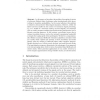Free Online Productivity Tools
i2Speak
i2Symbol
i2OCR
iTex2Img
iWeb2Print
iWeb2Shot
i2Type
iPdf2Split
iPdf2Merge
i2Bopomofo
i2Arabic
i2Style
i2Image
i2PDF
iLatex2Rtf
Sci2ools
ECML
2006
Springer
2006
Springer
Deconvolutive Clustering of Markov States
In this paper we formulate the problem of grouping the states of a discrete Markov chain of arbitrary order simultaneously with deconvolving its transition probabilities. As the name indicates, this problem is related to deconvolutive blind signal separation. However, whilst the latter has been studied in the context of continuous signal processing, e.g. as a model of a real-room mixing of sound signals, our technique tries to model computer-mediated group-discussion participation from a discrete event-log sequence. In this context, convolution occurs due to various time-delay factors, such as the network transmission bandwidth or simply the typing speed of the participants. We derive a computationally efficient maximum likelihood estimation algorithm associated with our model, which exploits the sparsity of state transitions and scales linearly with the number of observed higher order transition patterns. Results obtained on a full day worth dynamic real-world Internet Relay Chat part...
Discrete Event-log Sequence | Discrete Markov Chain | ECML 2006 | Machine Learning | Markov Chains |
Related Content
| Added | 22 Aug 2010 |
| Updated | 22 Aug 2010 |
| Type | Conference |
| Year | 2006 |
| Where | ECML |
| Authors | Ata Kabán, Xin Wang |
Comments (0)

